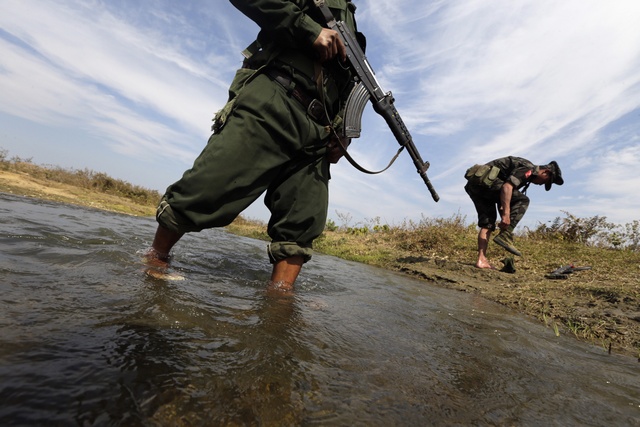The decisions by several western governments, including the US, the UK and Australia, to re-engage with the Burmese military has dismayed ethnic rights activists, who say it could fuel abuses in the country’s border regions.
In an open letter published on Thursday, a coalition of 133 ethnic NGOs urged western governments to consider their concerns before increasing military-to-military ties with the former dictatorship.
“They have destroyed our villages, stolen our land, forced us to serve as their slave labor, to carry their equipment as they hunt down, torture, kill, and enslave our fellow ethnic brothers and sisters, and rape, gang-rape, and sexually assault our women and girls,” said the letter.
“There is not a family amongst us who has not lost a loved one or survived an atrocity committed by the Burmese military,” it continued.
The UK, the US and Australia have all pledged to step up military cooperation with Burma as part of their diplomatic re-engagement with the former pariah state. But they have stressed that this engagement will focus on human rights training and efforts to transform the Burmese army into a professional and law-abiding defence force.
But activists insist that it is not a lack of knowledge about human rights norms that is driving abuses against ethnic minorities, which make up roughly 40 percent of the population and have suffered decades of oppression at the hands of the government.
“Burmese military leadership orders their officers and soldiers to violate our human rights precisely because that is the objective they aim to achieve,” warned the letter.
“The Burmese military wants to control our land and resources but more so they want to destroy our culture, break our spirit, break our desire for self-determination, demoralise us, and wear down our resistance until we break and agree to their rule.”
[related]
Armed ethnic groups have been fighting the central government for greater autonomy and rights since independence from the British in 1948. The armed forces, or Tatmadaw, have been implicated in serious human rights abuses amounting to war crimes and ethnic cleansing in some parts of the country.
President Thein Sein has been credited for introducing a series of democratic reforms in Burma since taking office in March 2011, including inking peace deals with 10 major ethnic armed groups. But conflict continues to flare around the country’s volatile borders, and civil war resumed in northern Kachin state in June 2011, displacing over 100,000 people.
Thein Sein has yet to acknowledge that human rights abuses have been perpetrated by the Burmese army nor has he indicated that the government is interested in pursuing any measures for transitional justice.
Under Burma’s 2008 constitution, the army is also granted blanket immunity for any crimes committed in warfare. Activists say this failure demonstrates the government’s disinterest in genuine democratic reform and reconciliation.
The group called on western governments to demand that Burma amend its 2008 constitution, which is considered deeply undemocratic and grants the military 25 percent of seats in parliament, as well as to introduce a meaningful accountability mechanism for past abuses.



